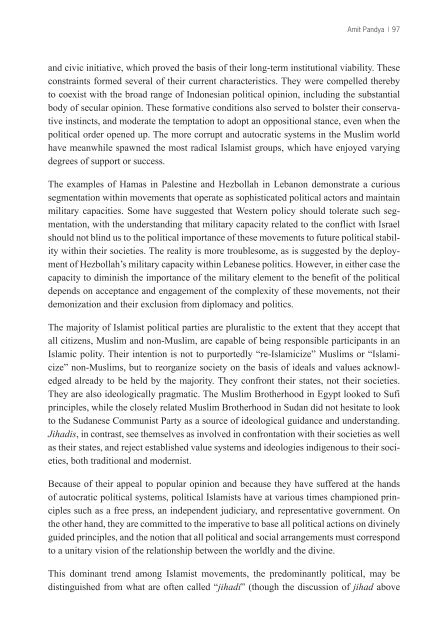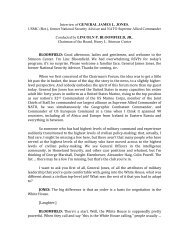Islam and Politics - The Stimson Center
Islam and Politics - The Stimson Center
Islam and Politics - The Stimson Center
You also want an ePaper? Increase the reach of your titles
YUMPU automatically turns print PDFs into web optimized ePapers that Google loves.
Amit P<strong>and</strong>ya | 97<br />
<strong>and</strong> civic initiative, which proved the basis of their long-term institutional viability. <strong>The</strong>se<br />
constraints formed several of their current characteristics. <strong>The</strong>y were compelled thereby<br />
to coexist with the broad range of Indonesian political opinion, including the substantial<br />
body of secular opinion. <strong>The</strong>se formative conditions also served to bolster their conservative<br />
instincts, <strong>and</strong> moderate the temptation to adopt an oppositional stance, even when the<br />
political order opened up. <strong>The</strong> more corrupt <strong>and</strong> autocratic systems in the Muslim world<br />
have meanwhile spawned the most radical <strong>Islam</strong>ist groups, which have enjoyed varying<br />
degrees of support or success.<br />
<strong>The</strong> examples of Hamas in Palestine <strong>and</strong> Hezbollah in Lebanon demonstrate a curious<br />
segmentation within movements that operate as sophisticated political actors <strong>and</strong> maintain<br />
military capacities. Some have suggested that Western policy should tolerate such segmentation,<br />
with the underst<strong>and</strong>ing that military capacity related to the conflict with Israel<br />
should not blind us to the political importance of these movements to future political stability<br />
within their societies. <strong>The</strong> reality is more troublesome, as is suggested by the deployment<br />
of Hezbollah’s military capacity within Lebanese politics. However, in either case the<br />
capacity to diminish the importance of the military element to the benefit of the political<br />
depends on acceptance <strong>and</strong> engagement of the complexity of these movements, not their<br />
demonization <strong>and</strong> their exclusion from diplomacy <strong>and</strong> politics.<br />
<strong>The</strong> majority of <strong>Islam</strong>ist political parties are pluralistic to the extent that they accept that<br />
all citizens, Muslim <strong>and</strong> non-Muslim, are capable of being responsible participants in an<br />
<strong>Islam</strong>ic polity. <strong>The</strong>ir intention is not to purportedly “re-<strong>Islam</strong>icize” Muslims or “<strong>Islam</strong>icize”<br />
non-Muslims, but to reorganize society on the basis of ideals <strong>and</strong> values acknowledged<br />
already to be held by the majority. <strong>The</strong>y confront their states, not their societies.<br />
<strong>The</strong>y are also ideologically pragmatic. <strong>The</strong> Muslim Brotherhood in Egypt looked to Sufi<br />
principles, while the closely related Muslim Brotherhood in Sudan did not hesitate to look<br />
to the Sudanese Communist Party as a source of ideological guidance <strong>and</strong> underst<strong>and</strong>ing.<br />
Jihadis, in contrast, see themselves as involved in confrontation with their societies as well<br />
as their states, <strong>and</strong> reject established value systems <strong>and</strong> ideologies indigenous to their societies,<br />
both traditional <strong>and</strong> modernist.<br />
Because of their appeal to popular opinion <strong>and</strong> because they have suffered at the h<strong>and</strong>s<br />
of autocratic political systems, political <strong>Islam</strong>ists have at various times championed principles<br />
such as a free press, an independent judiciary, <strong>and</strong> representative government. On<br />
the other h<strong>and</strong>, they are committed to the imperative to base all political actions on divinely<br />
guided principles, <strong>and</strong> the notion that all political <strong>and</strong> social arrangements must correspond<br />
to a unitary vision of the relationship between the worldly <strong>and</strong> the divine.<br />
This dominant trend among <strong>Islam</strong>ist movements, the predominantly political, may be<br />
distinguished from what are often called “jihadi” (though the discussion of jihad above

















